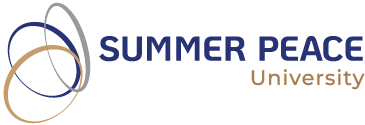Academic Program
The Academic Program of the Summer Peace University offers an intensive and interdisciplinary academic experience crafted to enrich participants’ comprehension of global challenges. It equips them with essential skills to emerge as effective leaders in peace and international cooperation.

Structured around thematic modules, the program encompasses diverse topics:
Theories of Peace and Nonviolence: Delve deeply into key theories and methodologies essential for peacebuilding and conflict resolution.
Diplomacy and Negotiation: Explore diplomatic strategies and negotiation techniques crucial for fostering international cooperation and resolving conflicts peacefully.
Sustainable Development and Social Justice: Examine challenges concerning sustainable development, social equity, and inclusivity, with a focus on advancing a fairer and sustainable global community.
Intercultural Mediation and Interreligious Dialogue: Gain insights into the dynamics of intercultural mediation and interreligious dialogue as tools to promote mutual understanding and social cohesion.
Leadership for Peace: Cultivate leadership capabilities required to drive peace initiatives and international cooperation within intricate, multicultural environments.
The academic curriculum includes lectures, interactive workshops, practical case simulations, laboratory sessions, and group activities, ensuring a comprehensive and dynamic learning journey. Participants will engage closely with esteemed faculty specializing in peace and international cooperation, alongside collaborating with peers from diverse cultural backgrounds and nationalities.
Masterclass
OCT
21
WEEK 1
GEOPOLITICS AND THE FUTURE
Monday, October 21st
Theme: Introduction to the Master and Presentation of the Participants
Key Concepts of International Cooperation.
Lessons on the Fundamentals of Peace and Conflict.
The Role of Future Leaders in Promoting Peace.
Tuesday, October 22nd
Theme: Current Geopolitical Situation and Future Scenarios
Discussion of Possible Future Scenarios based on Current Trends, including Potential Conflicts and Opportunities for Cooperation.
Analysis of the main global players, their relationships and current geopolitical tensions.
Wednesday, October 23th
Topic: Crisis of Democracies and the Role of the Media in the New Matrix
Examination of the Challenges Democracies Face Globally, including the Erosion of Civil Rights and the Rise of Autocracy.
Political context: Tensions and polarizations that threaten the stability of democracies.
Social implications: Role of the media in influencing public opinion and trust in the democratic process.
Media economics: Financial dynamics between traditional newspapers and online platforms.
Regulation: Challenges in regulating the media to preserve freedom of expression and counter disinformation
Thursday, October 24th
Theme: The role of new technologies, Artificial Intelligence and the Future of Humanity
Exploring the Growing Role of AI in Society, including Ethical, Social and Political Implications.
Technological Innovation: the impact of new technologies on society.
Role of Artificial Intelligence (AI): How AI is changing work and privacy
Future with Advanced Technologies: the long-term implications on our lives.
Ethics and Digital Regulation: the ethical challenges and the need for regulations for the responsible use of technologies.
The current of thought of " Transhumanism ".
Friday, October 25th
TED Talk on Wars of Religion:
Presentation of Experts on Conflicts Related to Religion, Current and Past.
Practical Activity
Diplomatic Escape Room – Students will participate in an Escape Room Game based on Real Geopolitical Scenarios to Solve Puzzles and Deal with Crises.
OCT
28
WEEK 2
ECONOMY AND INEQUALITIES
Monday, October 28st
Theme: Global Geopolitics of Energy
Discussion on the Role of Energy in Geopolitics.
Study of Existing Energy Markets and their Dynamics.
Tuesday, October 29th
Topic: The European Union System and Global Political and Commercial Relations
Exploring the Role of the EU in Global Trade and Political Relations.
Structure of the EU: Institutions and main roles.
EU policies: Priority sectors and strategies.
Global political relations: Diplomacy and cooperation with other nations.
Global trade relations: Trade agreements and external trade policies.
Wednesday, October 30th
Topic: The Future of the Global Economy and Wealth Inequalities
Forecasts on Future Economic Trends.
Analysis and Discussion on the Distribution of Wealth and Existing Inequalities.
Global Economic Trends: Analysis of global dynamics, including trade, technology and economic policies
Economic Inequalities: Study of disparities in income and economic power worldwide.
Economic and Social Policies: Evaluation of policies to address inequalities, such as tax reforms and access to education.
Thursday, October 31st
Topic: Economic Models: The Economics of Happiness
Core Concept: Happiness economics focuses on subjective well-being and quality of life as crucial indicators of economic success, going beyond the traditional focus on income and production.
Measuring well-being: the quantification of happiness through conventional indicators and the use of measurement methodologies.
Public policies: designing public policies, directing government interventions towards improving general well-being rather than exclusively economic growth.
Criticisms and challenges: the difficulty of translating these concepts into concrete policies and the need to balance individual well-being with more traditional economic objectives.
Friday, November 1st
TED Talk on Global Goals For Sustainable Development (SDGs):
Presentation of Experts on the SDGs and Their Role in Sustainable Development.
Practical Activity
Mindfulness Experiences for Peace – A Guided Mindfulness Session with a Focus on Visualizations to Promote Global Peace and Empathy.
NOV
4
WEEK 3
CLIMATE CHANGE, JUSTICE AND CORRUPTION
Monday, November 4th
Topic: The Problem of Global Climate Change and Possible Solutions
Examination of the Causes of Climate Change and Strategies to Mitigate It.
Understanding the Problem: Scientific analysis of climate change, its causes and consequences on our planet
Socioeconomic Impact: Discussion of the impact of climate change on society
and the global economy.
Role of Technology: Exploring emerging technologies that can help mitigate the
effects of climate change.
Political and Social Action: necessary policies and involvement of civil society to
effectively address climate change.
Tuesday, November 5th
Theme: Accessible Education and Global Citizenship for a Sustainable Future
Role of Education in Promoting Global Citizenship.
Importance of Access to Education to Fight Poverty and Promote Equality.
World Citizenship: Discussion of the role of education in promoting global citizenship.
Sustainability: Reflection on how education can contribute to a sustainable future.
Wednesday, November 6th
Topic: Ethics and Morality in Contemporary Leadership
Importance of Ethics and Morals in the Promotion of Peace and Social Harmony.
Vision and Values: Clear definition of the ethical and moral values that guide the actions of contemporary leaders
Integrity and Responsibility: Commitment to impeccable ethical and moral behavior, taking responsibility for one's actions and decisions.
Inclusion and Diversity: Promoting ethical leadership that respects and values diversity and inclusion, creating fair and just work environments
Thursday, November 7th
Topic: Corruption and Its Implications for Society
Definition and nature of corruption: the complexity of corruption as abuse of power for personal gain, involving illegal or ethically questionable practices.
Economic and social impact: obstacle to economic and social development, generating inequalities, weakening public institutions and damaging citizens' trust in government and institutions.
Consequences for justice and the legal system: How corruption undermines the effectiveness of justice and the legal system, compromising impartiality, transparency and equal access to justice.
Anti-corruption and prevention strategies: measures and policies aimed at combating corruption, including supervisory systems, institutional reforms, ethics education and punishment for perpetrators.
Friday, November 8th
TED Talk on Justice and Its Role in Society:
Expert Presentations on Global Justice: Equity and Human Rights
Practical Activity
Storytelling Laboratory – Storytelling Techniques and Creation of Narratives on Justice and Corruption Topics.
NOV
11
WEEK 4
MIGRATIONS, RACISM AND HUNGER IN THE WORLD
Monday, November 11th
Topic: Migrations: Causes, Effects and Migration Policies.
Discussion on Migration Policies at Global and National Level.
Analysis of the Causes and Consequences of Migrations.
Tuesday, November 12th
Topic: World Hunger: Causes and Possible Solutions.
Causes of World Hunger: Extreme poverty, conflicts, climate change and socioeconomic inequalities.
Access to Food: Improving access to agricultural resources, food assistance and investments in rural infrastructure.
Education and Sustainable Development: Promotion of sustainable agricultural practices, reduction of food waste and adoption of sustainable development policies.
International Collaboration: Cooperation between nations, investments in agricultural development in developing countries and financial support to address the structural causes of hunger.
Wednesday, November 13th
Topic: Racism and Strategies to Fight It in Different Societies.
Origins and forms of racism: the historical and cultural roots of racism and its current manifestations.
Impact on communities: How racism affects the mental health, economic opportunities and social integration of communities.
Countering strategies: policies and actions aimed at countering racism and promoting equality.
Cultural and global perspectives: the different cultural and global perspectives on racism and the strategies adopted in different sociocultural contexts.
Thursday, November 14th
Drafting of the white document
Synthesis of knowledge and analysis of the knowledge acquired through the drafting of a white document.
This document will propose practical actions to address the topics covered by demonstrating their ability to apply the skills acquired.
Friday, November 15th
Final Presentation of Student Projects
Study Material
Each Lesson Includes both Theoretical Components and Practical Activities, such as Negotiation Simulations, Role Playing and Case Study Analysis. TED Talk Style Meetings will be held by Industry Experts or Thought Leaders.
The Master provides an in-depth understanding of global problems and the skills necessary to become effective leaders in the field of peace and international cooperation.
%
satisfied participants
international experts
Collaborative Environment
weeks of training
Shape a Better Tomorrow
This summer, invest in your future and the future of our world. Join the Summer Peace University for a transformative educational experience. Learn from renowned international experts and participate in interdisciplinary activities designed to foster global leadership and cooperation.
Don’t miss this opportunity to become a leader who drives positive change!
